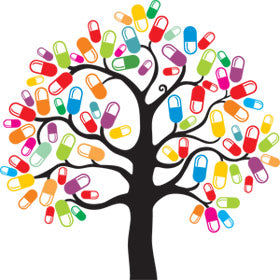From chewable Flinstone's to Centrum Silver, it seems as if every age group is targeted for vitamin use. And, with new multivitamins for men, women, seniors, children, athletes, and more, it seems that the vitamin market is booming. Health stores in malls and shopping centers seem to be flourishing too. But still, many people seem underinformed about vitamins and if we really need them. And if so, what, how, and when to take them. In this brief article, we'll look at some of the main vitamin types, what they do for the body, where they can be received from, and more.
Vitamins themselves do not give the body energy. However, they are chemical compounds that aid in important metabolic processes. There are many vitamins inside the food we eat, but the typical Western diet does not account for the amounts we really should be taking.

There are 13 vitamins that can be divided into two categories: water-soluble and fat-soluble. Water-soluble vitamins, with the exception of B12, can be supplied by plants in the diet. This type of vitamin is not stored in the body for a very long time, which means it needs to be consumed regularly. Primarily, and scientifically speaking, water-soluble vitamins serve as coenzymes in metabolic reactions. The majority of the water-soluble vitamins are 'B' vitamins, which play a role in energy metabolism. They also include thiamin, riboflavin, niacin, pyridoxine, folic acid, and vitamin C. Thiamin is important in metabolizing carbohydrates, riboflavin can help oxidize fatty acids among many other things, niacin helps change fat to glucose, pyridoxine helps with metabolism, folic acid is involved in DNA and protein synthesis (the DNA portion of this is probably why many women trying to conceive take folic acid supplements), B12 helps in fatty acid metabolism and finally, vitamin C serves as an antioxidant in addition to several other uses. As you can see, the processes these vitamins aid a great deal in everyday body function. Many of the foods we eat and drink contain these vitamins. But sometimes, we may not consume enough of those foods and need to take a vitamin. For example, milk is one of our greatest sources of riboflavin, but the lactose intolerant and vegans are missing out. Also, meat and fish are the only sources of B12.
Many medical conditions can come from vitamin deficiencies. Or, in some cases, vitamins are used to treat some conditions. Those with anemia, a blood disorder, are often given B12. Those who lack enough thiamin become fatigued because the body isn't making enough energy. Scurvy is caused by a vitamin C deficiency. Also, many symptoms of alcoholism are treated with this vitamin. Niacin is used to treat Down's Syndrome, autism, diabetes, and depression.
Fat soluble vitamins differ from the water-soluble in that they are absorbed, together with fat from the intestine, into the body's circulation. So, any disease or disorder that affects the absorption of fat, such as coeliac disease, could lead to a deficiency of these vitamins. Once absorbed into the circulation these vitamins are carried to the liver where they are stored. Fat-soluble vitamins include A, D, E, and K, with vitamins A, D and K stored in the liver and vitamin E is distributed throughout the body's fatty tissues. Sometimes these vitamins can build up to toxic levels, but they can be removed by antibiotics. Fat-soluble vitamins are best taken with food.
For those who eat healthy diets with vitamin-filled foods as well as take vitamins in the form of pills, they could be at risk of overdose. There can be too much of a good thing when it comes to vitamins. Vitamins, especially pyridoxine (B6) should be taken with eight glasses of water each day. Too many certain B vitamins can cause liver damage.
Vitamins should traditionally be taken with a full glass of water. It is also noted that multivitamins also be taken with a glass of water. However, some new products allow you to literally take vitamins with water. SoBe, a hip beverage maker, has launched a new vitamin water line called SoBe Life Water. The beverage, which comes in five flavors, contains vitamins C, E, and several of the B family. There are also many healthy foods and drink companies that have been making vitamin water for years.
Whether you get the essential vitamins you need daily through a healthy diet, or through taking daily doses of a vitamin, making sure you have all the right amounts of those letters A, B, C, D, E, and K are sure to keep your body healthy and happy. Add plenty of water to the mix, and the vitamins will get to the right place.



